Wiki Rabbit Hole: Summer to Seoul
Turn a borderline-addictive habit into an opportunity to learn more about the world.
What an adventure! I went around the world in 45 minutes!
I strive to improve myself and expand my perspective, even if it’s little by little. I want to learn more about the world I live in. And recently, I developed a new way to transform a borderline-addictive habit of mine into an opportunity.
I love Wikipedia. As a kid, my grade school library had physical encyclopedias, usually a year or two behind. There would be like twenty-three books in alphabetical order. My friends and I got way too excited flipping through random pages. Later, I was jealous of my cousin, who had access to Britannica Online software. Now, if you have internet access you can learn whatever you want for free. I think it’s fantastic for the world.
The one thing about Wikipedia, though, is that I use it to research something specific but diverge from the path and time escapes me. This is commonly known as the “Wikipedia Rabbit Hole” or “Wikihole.” But instead of feeling somewhat disappointed with my reckless use of time, I’ve created an exercise to help me learn more about the world, and maybe even myself. I set a time for 45 minutes and, within that time, I’m allowed to go anywhere on Wikipedia. You can do this too!
Ready?
Go!
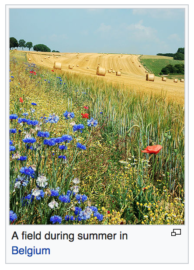 It’s a chilly October afternoon. I stare out the window of my apartment. Passersby wear jackets and straight faces. Not long ago, the sun shined and filled everyone with energy. Summer is clearly over. So as a last nod to summer, I begin my Wiki rabbit hole journey with summer. Almost immediately, I clicked on summer vacation.
It’s a chilly October afternoon. I stare out the window of my apartment. Passersby wear jackets and straight faces. Not long ago, the sun shined and filled everyone with energy. Summer is clearly over. So as a last nod to summer, I begin my Wiki rabbit hole journey with summer. Almost immediately, I clicked on summer vacation.
A handful of years ago, I learned about KIPP schools. KIPP is a non-profit network of college prep charter schools in underserved communities throughout the U.S. They have high expectations and their students consistently outperform the national average. I’ve become convinced that American students should be in school year-round, with longer breaks scattered throughout. This model intends to reduce summer learning loss, where academic skills and knowledge recedes over the course of a summer. I felt this was the case for me. I’d return to school a step behind from where I was months ago. What’s the history of summer vacation in America?
Summer Vacation
Summer vacation typically lasts twelve weeks; school districts determine the length of summer break. However, I found it interesting that the dates differed between northern states compared to southern and western states, who end and return earlier. It’s believed that summer vacation is rooted in the farming calendar, where children could be available to help their families for three months. That doesn’t make sense to me though. I grew up on a farm. Spring and Fall are more important. As the country grew, an effort was made to align rural and urban academic calendars for more national cohesion. “As the country became more industrial and wealthy, and was in the process of recovering from the Civil War, leisure activity became more important to Americans.” A leading advocate for this was Henry Curtis. 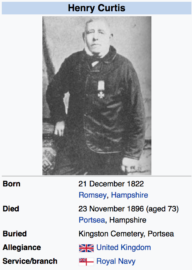 He thought children weren’t getting enough time for play. “In addition to advocating playground equipment, Curtis also advocated that summer should be spent working with families in gardens, and going camping.” He emphasized lifelong skills. I wanted to learn more about him so I clicked his name.
He thought children weren’t getting enough time for play. “In addition to advocating playground equipment, Curtis also advocated that summer should be spent working with families in gardens, and going camping.” He emphasized lifelong skills. I wanted to learn more about him so I clicked his name.
Oddly, it led me to a wiki page of an Englishman who served in the Navy in the 1850’s and fought in the Crimean War. There was no mention of Henry Curtis’s advocacy for leisure activity. So, instead, I typed “Henry Curtis” in the Wikipedia search bar for more people. I clicked on Sir Henry Curtis (fictional character in King Solomon’s Mines). I want to know about this guy.
King Solomon’s Mines
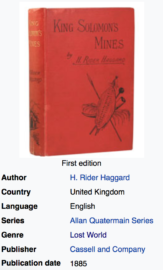 The Victorian era novel takes place in Africa, where characters search from someone last seen hunting for the fabled King Solomon’s Mines. The book essentially created a new subgenre of science fiction referred to as “Lost World,” where Europeans discovered unexplored worlds and remnants of lost civilizations. During this time, archeological expeditions uncovered tombs in Egypt’s Valley of the Kings, Mayan pyramids in the jungle, and palaces built by the Assyrian empire. The public was captivated. The “Lost World” genre inspired waves of writers, including Rudyard Kipling and Arthur Conan Doyle. The theme mirrored the myth of El Dorado. One of my favorite animated movies was El Dorado as a kid. Why not learn more about it?
The Victorian era novel takes place in Africa, where characters search from someone last seen hunting for the fabled King Solomon’s Mines. The book essentially created a new subgenre of science fiction referred to as “Lost World,” where Europeans discovered unexplored worlds and remnants of lost civilizations. During this time, archeological expeditions uncovered tombs in Egypt’s Valley of the Kings, Mayan pyramids in the jungle, and palaces built by the Assyrian empire. The public was captivated. The “Lost World” genre inspired waves of writers, including Rudyard Kipling and Arthur Conan Doyle. The theme mirrored the myth of El Dorado. One of my favorite animated movies was El Dorado as a kid. Why not learn more about it?
El Dorado
Spanish conquistadors in the 16th century searched for an empire of gold. The legend—as you can imagine—shifted throughout time. The conquistadors explored much of northern South America in hopes of finding El Dorado and exploiting it for its riches. Ironically, mapping the Amazon River and this part of the continent was the result. 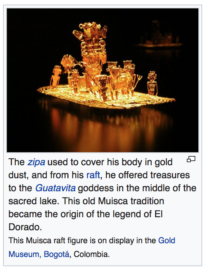 They encountered the Muisca people in the highlands of now Colombia. These people were considered as advanced as the Aztec, Mayan, and Incan civilizations. The human rulers of their two capital cities, Hunza and Bacatá were believed to be descendants of mythical creatures. Bacatá has got to be Bogotá, right?
They encountered the Muisca people in the highlands of now Colombia. These people were considered as advanced as the Aztec, Mayan, and Incan civilizations. The human rulers of their two capital cities, Hunza and Bacatá were believed to be descendants of mythical creatures. Bacatá has got to be Bogotá, right?
Bogotá
I know general information about Bogotá. My most extensive research comes from binge-watching the Netflix original show, Narcos. While scrolling through the page, a certain sentence caught my eye. “Bogotá ranks 52nd on the Global Cities Index 2014 and is considered a global city type ‘Alpha’ – by GaWC.” Tell me more about this Global Cities Index!
Global Cities Index
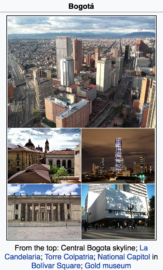 The Global Cities Index page makes me imagine a group of financial dudes drinking scotch in a London pub debating the greatest cities in the world like Midwest bros drinking beer arguing who the Elite quarterbacks are in the NFL. “Dude, we need to first establish the criteria for ranking.”
The Global Cities Index page makes me imagine a group of financial dudes drinking scotch in a London pub debating the greatest cities in the world like Midwest bros drinking beer arguing who the Elite quarterbacks are in the NFL. “Dude, we need to first establish the criteria for ranking.”
- The variety of financial services like finance, insurance, real estate, accounting, and marketing
- Number of multinational headquarters
- Domination of trade and economy in a large surrounding area
- Major manufacturing centers with ports and container facilities
- Considerable decision-making power on a daily basis and a global level
- Center for innovation in business, economics, culture, and politics
- Center of media and communications for global networks
- Dominance of national region and great international influence
- High percentage of residents employed in the services and information sectors
- High-quality educational institutions
- High diversity in language, culture, religion, and ideologies
The Global Cities Index classifies cities into three groups: Alpha, Beta, and Gamma. However, the Alpha group breaks down into four sections: Alpha ++, Alpha +, Alpha, and Alpha -. A little confusing right?
I can’t help but laugh reading this. Really smart people calculated the power of each city, but they left the group and section names to a Kindergarten class. I mean, seriously?
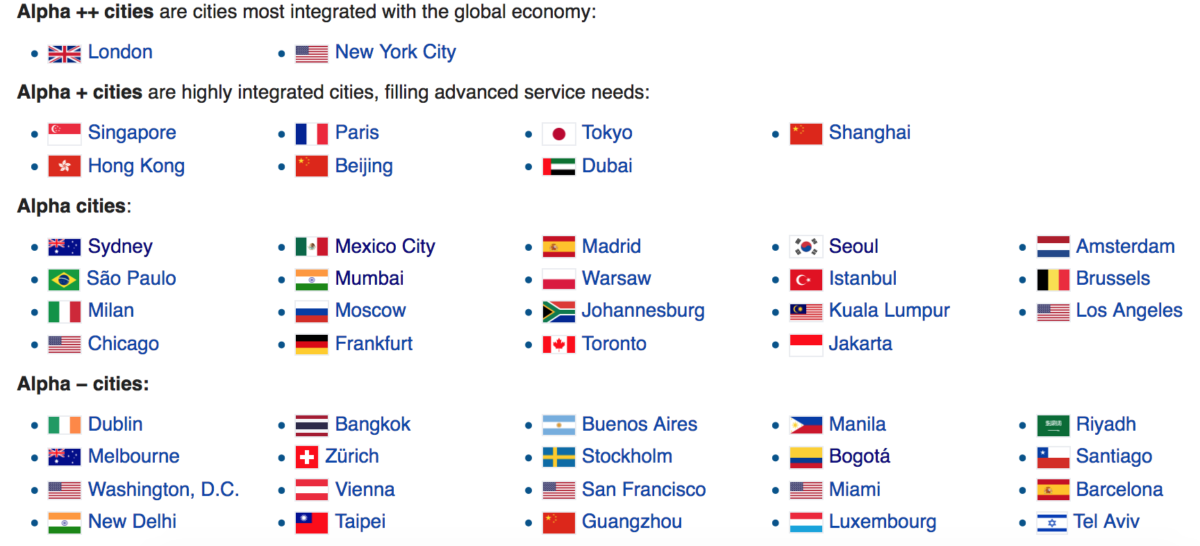
Looking at a list like this helps me imagine the scale of these cities and what they offer, especially as a resident of Chicago. The Alpha + cities seem predictable to me but once I looked at the Alphas, some surprised me. Milan ranks higher than Rome? Frankfurt over Berlin? I figured commerce played a big role. So which cities have the top GDPs?
Top city/Metropolitan Area GDPs
 Hey! Chicago, is #6. How about that? Seoul, however, stuck out the most to me. As a bartender, I’ve noticed this city pop up an interesting amount of conversations I’ve eavesdropped on. The topics range from just a cool city to visit, a city with huge companies like Samsung or Hyundai, or the capitol of a country that borders North Korea. What’s Seoul like?
Hey! Chicago, is #6. How about that? Seoul, however, stuck out the most to me. As a bartender, I’ve noticed this city pop up an interesting amount of conversations I’ve eavesdropped on. The topics range from just a cool city to visit, a city with huge companies like Samsung or Hyundai, or the capitol of a country that borders North Korea. What’s Seoul like?
Seoul
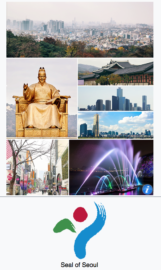 Seoul quickly became the most interesting wiki page I visited—not because of its content—but because it made me think about myself. It made me realize how Westernized I am. The contextual wiki’s looked fairly unrecognizable to me: names of places, geographical features, historical individuals. All the other wiki pages made sense to me. I could piece together information and clues from the page to piece together a picture in my mind. Seoul was tricky. I still have a vague understanding of Eastern culture and history, even after visiting Hong Kong, Vietnam, and Thailand last April. It’s not a bad thing, but it has my attention.
Seoul quickly became the most interesting wiki page I visited—not because of its content—but because it made me think about myself. It made me realize how Westernized I am. The contextual wiki’s looked fairly unrecognizable to me: names of places, geographical features, historical individuals. All the other wiki pages made sense to me. I could piece together information and clues from the page to piece together a picture in my mind. Seoul was tricky. I still have a vague understanding of Eastern culture and history, even after visiting Hong Kong, Vietnam, and Thailand last April. It’s not a bad thing, but it has my attention.
The point of the exercise is to generally learn more about the world around me. It’s not to become an expert on any of the particular wiki subjects I stumble across. I hear there are two philosophies to live life: know everything about one subject or know a little about many subjects. I prescribe to the latter. It’s not because I feel it’s better—there’s no right or wrong—but I find myself interested in a lot of things. I’m curious to learn more about them and performing this exercise fulfills that desire.
Do you ever go down a wiki rabbit hole on purpose? What are some of the things you’ve learned? What topics excite you most?
*All photos are screenshots from each’s wiki*